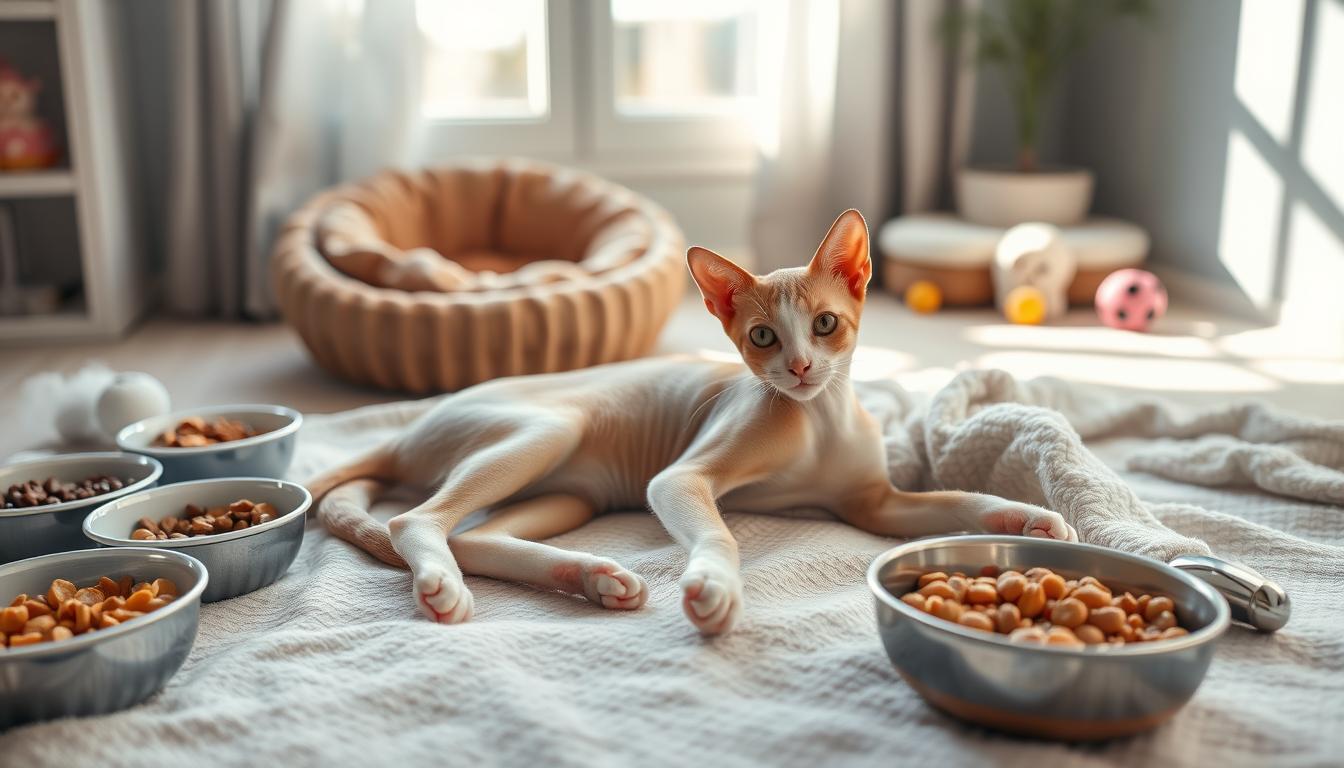Many cat owners worry when their pets seem too thin. Knowing why your cat might be underweight can ease your concerns. This guide will cover why cats can be too skinny, the importance of their diet, and how to keep them healthy.
By understanding these points, you can help your cat stay in good shape. This will also strengthen your bond with them. With the right care, your cat can be happy and healthy.
Key Takeaways
- The ideal body condition score for cats is 5; scores below 4 indicate underweight status.
- Malnutrition is frequently seen in newly adopted cats or those from hoarding situations.
- Rapid weight loss can cause severe health issues, including liver failure.
- Introducing small, frequent meals helps underweight cats safely gain weight.
- Regular vet check-ups are critical for early issue detection in cats.
- Using both dry and wet food can be beneficial for promoting weight gain.
- Understanding your cat’s body can help catch weight loss signs early.
Understanding Why Your Cat Is Skinny
Weight loss in cats worries many pet owners. Several factors can cause this, from dental pain to health issues. Knowing the common causes of weight loss in cats helps tackle problems effectively.
Common Causes of Weight Loss
Many reasons can make a cat underweight. Key factors include:
- Dental Issues: Painful conditions like gingivitis or broken teeth can discourage eating.
- Stress: Changes, like moving, can reduce appetite.
- High Activity Levels: Some breeds, like the Oriental Shorthair, are naturally slim and burn more calories.
- Age-Related Factors: Senior cats may lose weight due to age-related illnesses.
Health Conditions to Consider
Medical conditions also play a role in weight loss. Some health conditions in skinny cats include:
- Hyperthyroidism: An overactive thyroid can cause weight loss despite normal or increased appetite.
- Diabetes: This condition affects food processing, leading to weight loss.
- Gastrointestinal Disorders: Issues like malabsorption can severely impact weight gain.
- Kidney Disease: Common in older cats, kidney issues can lead to decreased appetite and weight loss.
- Cancer: Malignancies can cause cachexia, a muscle-wasting condition.
Managing weight loss starts with finding the cause. A vet’s help is key for diagnosis and treatment. Quick action is vital for cats losing weight rapidly or unexpectedly, ensuring they get the care they need.
Assessing Your Cat’s Body Condition
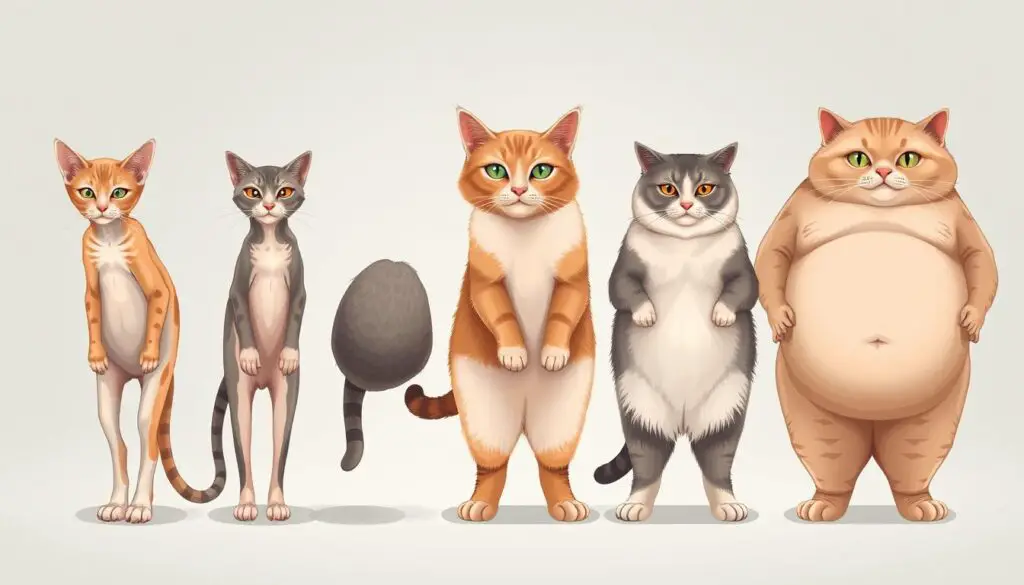
It’s important to know how to check your cat’s body condition. This helps keep them healthy and at a good weight. The Cat body condition score is a useful tool. It rates your cat from 1 to 9, showing if they’re too thin, just right, or too heavy.
Knowing your cat’s weight is key to their happiness and health.
Recognizing Ideal Weight for Cats
For a cat to be healthy, their body condition score should be 4 or 5. This means you can feel their ribs under a thin layer of fat. They should also have a clear waist and not much belly fat.
Spotting these signs is important for your cat’s health.
How to Properly Feel Your Cat’s Bones
Feeling your cat’s bones is a way to check their weight. Run your hands over their ribs, spine, and hips. You should feel the bones without seeing them too much. This shows they have a good amount of fat.
If you can see their ribs or their waist is too thin, they might be too light. This could mean they need to eat more.
| Body Condition Score (BCS) | Weight Status | Physical Indicators |
|---|---|---|
| 1-3 | Underweight | Visible ribs, narrow waist, lack of fat on rib cage, abdomen tucked up |
| 4-5 | Ideal Weight | Ribs not visible but easily felt, visible waist, minimal abdominal fat |
| 6-9 | Overweight | Ribs not visible, undefined waist, rounded abdomen, no abdominal tuck |
Checking your cat’s body condition score often is good for their health. It helps avoid weight problems. Talking to a vet can help you keep your cat at a healthy weight.
Importance of Nutrition for Cats
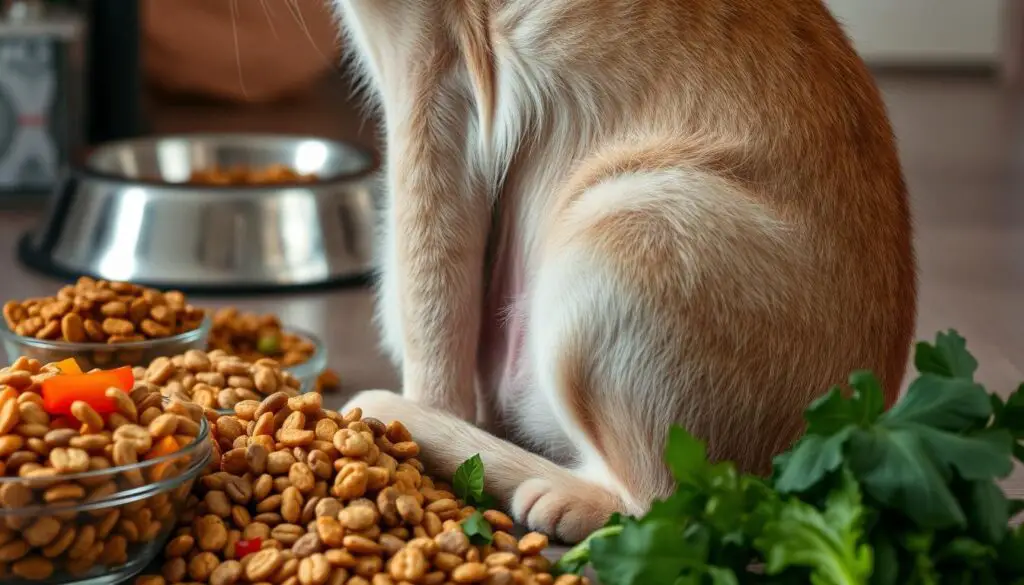
Nutrition is key to keeping cats healthy and at a good weight. Good cat nutrition means getting the right nutrients for overall health. Knowing what these nutrients are helps cat owners pick the best food.
Essential Nutrients for Healthy Weight
A balanced diet for cats should have the right essential nutrients for cats. These include:
- Proteins: Important for muscle health and growth.
- Carbohydrates: Give energy and help the digestive system stay healthy.
- Fats: Provide energy and help cells work well.
When cats eat these nutrients, they can get healthier and gain weight. Underweight cats might need more food to gain weight. Even a little more food can make a big difference.
Choosing the Right Cat Food
When picking cat food, look at the ingredients. Choose high-quality foods with whole, balanced ingredients. Mixing wet and dry food can make meals more interesting. This can help cats eat better and stay hungry, which is good for underweight cats.
Watch your cat’s health, even as they get older. Regular vet visits help figure out what nutrients they need. This ensures they get the best cat nutrition for staying healthy and at a good weight.
Crafting a Meal Plan for Your Cat

Creating a meal plan for underweight cats is key for their health. It’s not just about the food. You also need to think about how often to feed and how much. Planning meals carefully can greatly improve your cat’s health.
Frequency of Feeding
How often you feed your cat matters a lot. Giving them small meals all day is a good idea. This way, they get enough calories without feeling too full. Here’s what works best:
- Four to six small meals daily
- Keep meal times the same every day
- Choose foods that are high in protein
Portion Control Tips
It’s important to control how much food your cat eats. The right amount helps them stay healthy. Here’s how to do it right:
- Use measuring cups to know how much to give
- Ask your vet for the right amount based on your cat’s size and activity
- Only give treats that make up 10% of their daily calories
By paying attention to how often and how much you feed, you can help your cat gain weight healthily. This careful planning ensures they get all the nutrients they need for good health.
Monitoring Your Cat’s Weight
It’s important to keep an eye on your cat’s weight for their health. Regular weigh-ins give you insights into their well-being. A weekly check can spot any big changes early.
Regular Weigh-Ins
Do weigh-ins at least once a month for an accurate weight record. Use tools like the Beurer Digital Pet Scales for precise measurements. Here’s a simple guide for your weigh-in routine:
- Choose a specific day of the week for weigh-ins.
- Ensure your cat is calm and relaxed before weighing.
- Record the weight in a logbook to track changes over time.
Keeping a Weight Journal
A weight journal for cats is a great way to track progress. Note weight changes, feeding habits, appetite, and energy levels. This gives a full picture of your cat’s health. Here’s what to include:
| Date | Weight (kg) | Appetite Level | Energy Level | Observations |
|---|---|---|---|---|
| Week 1 | 4.5 | Good | Active | Playful behavior noted |
| Week 2 | 4.3 | Decreased | Less active | Visible ribs observed |
| Week 3 | 4.5 | Normal | Active | Returning to regular playtime |
| Week 4 | 4.2 | Picky | Low energy | Consult veterinarian for advice |
Keeping this journal up to date is helpful when talking to your vet. You can both decide if more medical checks are needed based on the data.
When to Consult a Veterinarian
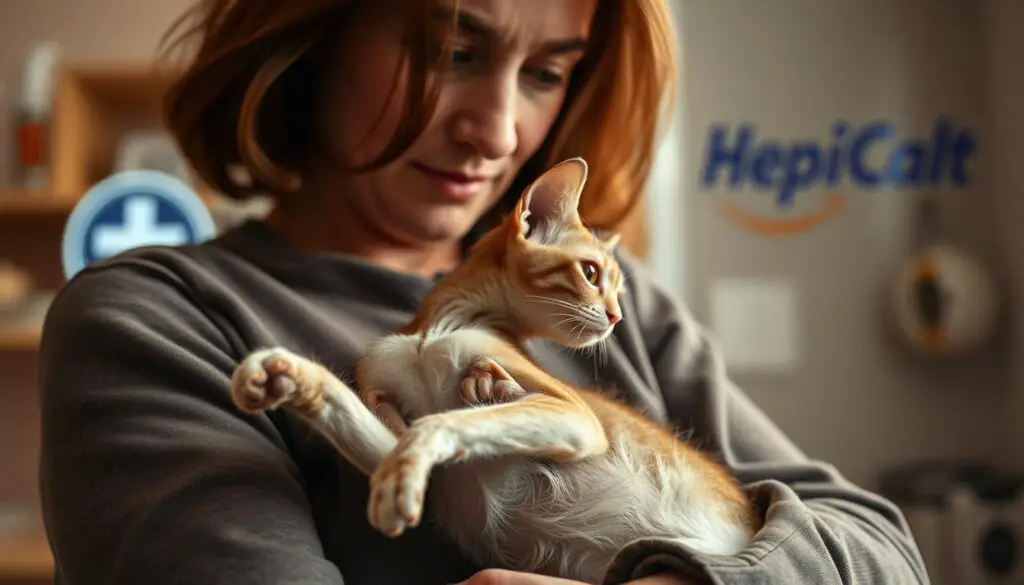
Knowing when to get help for a skinny cat is key to their health. Look out for signs to seek veterinary help to decide when to see a vet. These signs show health problems that need quick action.
Signs You Should Seek Help
- Significant weight loss over a short period
- Visible ribs, spine, or hip bones
- Decreased appetite or lack of interest in food
- Low energy levels or lethargy
- Dull or unkempt fur
- Changes in behavior or habits
Preparing for the Vet Visit
Getting ready for your vet visit can make it more helpful. Keep track of your cat’s weight and any changes in their eating, activity, and behavior. Bring your weight journal to talk about your cat’s health and any changes.
Being ready with all the information helps your vet understand your cat’s situation. Regular vet visits are crucial to help your cat gain weight and stay healthy.
Potential Health Issues in Skinny Cats
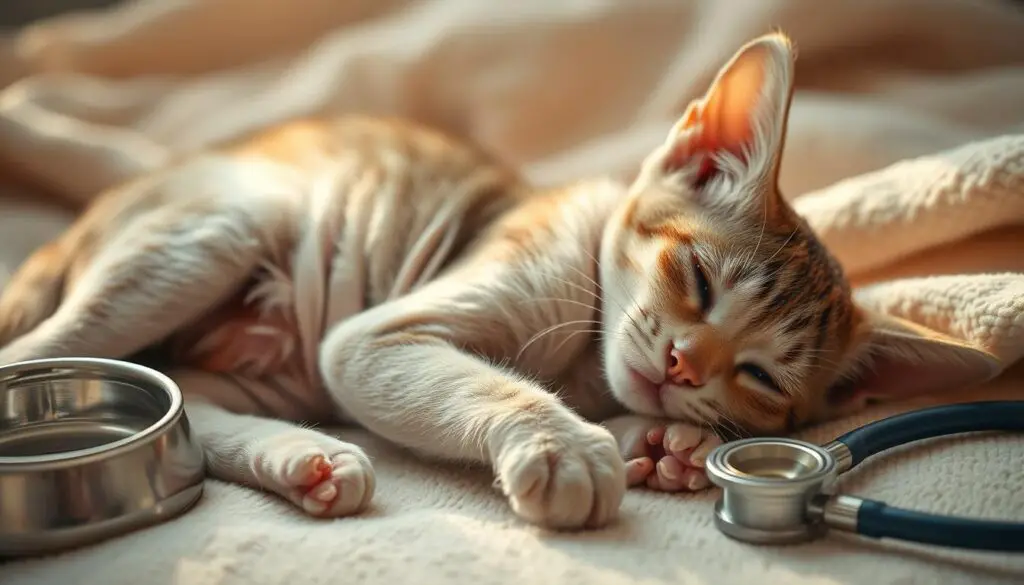
It’s important to know about health issues in cats to keep them healthy. Weight loss can be a sign of serious problems. Conditions like hyperthyroidism and diabetes often cause cats to lose weight.
Spotting these issues early can help your cat get better.
Hyperthyroidism and Its Implications
Hyperthyroidism happens when cats make too many thyroid hormones. This makes their metabolism go too fast, leading to weight loss even when they eat a lot. Cats with this condition might seem more active and drink or pee a lot more.
Seeing a vet regularly is crucial to catch this and find ways to treat it.
Diabetes and Weight Loss
Cat diabetes makes it hard for cats to use calories, leading to weight loss. Even if they’re hungry, they might look skinny. They might also feel tired and drink a lot of water.
Getting help quickly is key to managing diabetes and keeping your cat healthy.
Behavior Changes in Underweight Cats
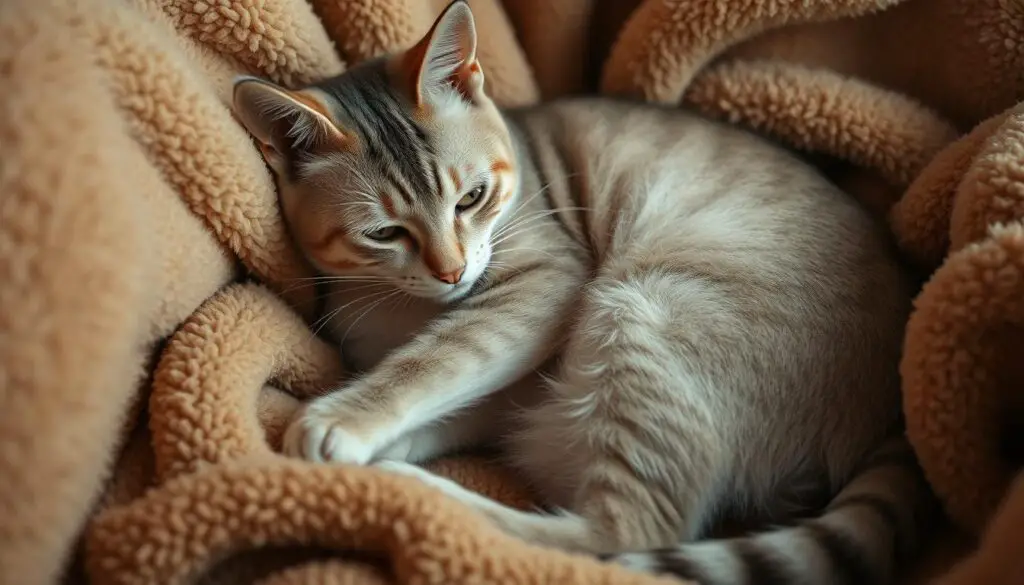
Behavioral changes in skinny cats are important signs of their health. Cats that are underweight may show signs of discomfort or distress. It’s crucial for pet owners to notice these changes early.
Recognizing these shifts can help improve the life of underweight cats. It shows how to better their quality of life.
How to Spot Behavioral Differences
Underweight cats may show several behavioral changes. Common signs include:
- Increased hiding – Cats might seek secluded spots to feel secure.
- Aggression – An underweight cat may react aggressively when approached due to discomfort.
- Excessive vocalization – They may vocalize more, expressing distress or the need for attention.
- Lethargy – Reduced activity levels can indicate a lack of energy associated with weight loss.
Impact on Overall Quality of Life
The quality of life in underweight cats can suffer a lot. This is due to both physical and emotional stress. Not treating health issues, like dental problems or chronic illnesses, can make things worse.
Regular vet visits are key to spotting medical issues affecting weight. They help provide timely care. A stress-free environment and proper nutrition also support a cat’s emotional well-being.
| Behavioral Changes | Possible Causes | Impact on Quality of Life |
|---|---|---|
| Increased hiding | Stress, pain | Reduced social interaction |
| Aggression | Discomfort, fear | Compromised human-animal bond |
| Excessive vocalization | Discomfort, need for attention | Increased anxiety levels |
| Lethargy | Health issues, low energy | Decreased quality of life |
The Role of Exercise in Cat Health
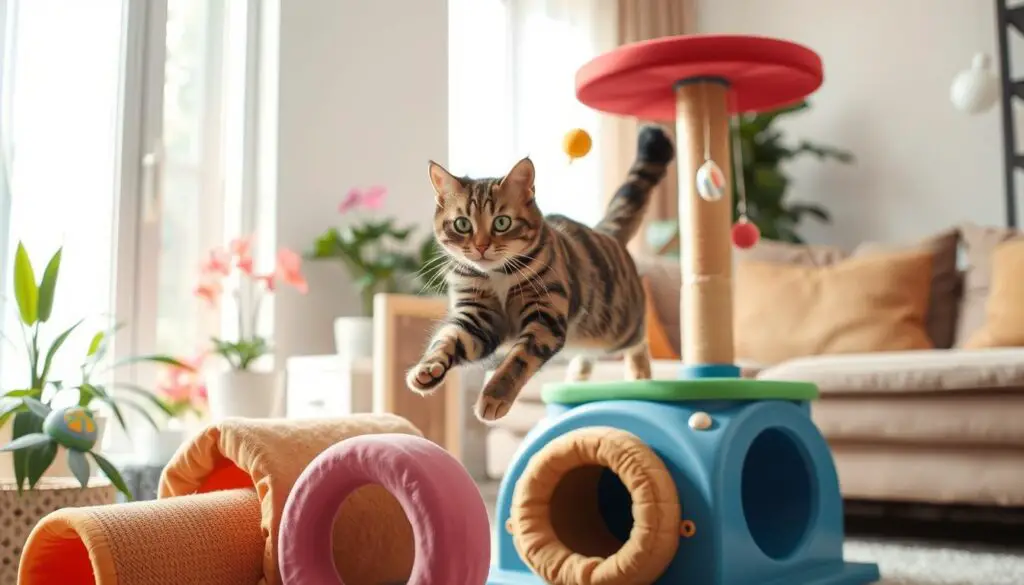
Keeping cats healthy means they need to exercise regularly. A good exercise plan helps them stay fit and full of energy. It also keeps their muscles strong. Different exercises are important for their health and happiness.
Types of Exercises for Cats
Knowing what exercises are best for your cat is key. Here are some fun options:
- Interactive play with toys: Feather wands and laser pointers make them feel like hunters.
- Climbing structures: Cat trees and shelves let them climb naturally.
- Puzzle feeders: These make them work for their food, boosting their activity.
- Reward-based training: Training sessions help them learn and stay active.
- Commercial toys: Toys like the KONG® Wobbler™ keep them busy while eating.
Creating an Engaging Playtime Routine
Having a set playtime schedule can really help. Here are some tips:
- Increase feeding frequency: Give them small meals throughout the day.
- Use timed cat feeders: These make them search for food, which gets them moving.
- Place food in challenging spots: This makes them explore and exercise.
- Stimulate play independently: Toys that move on their own can keep them playing.
- Encourage play during alone time: Toys can help prevent boredom when you’re away.
Regular exercise and play are vital for a cat’s health. By choosing the right exercises and setting a routine, you can help your cat stay fit and happy.
Preventing Weight Loss in Cats
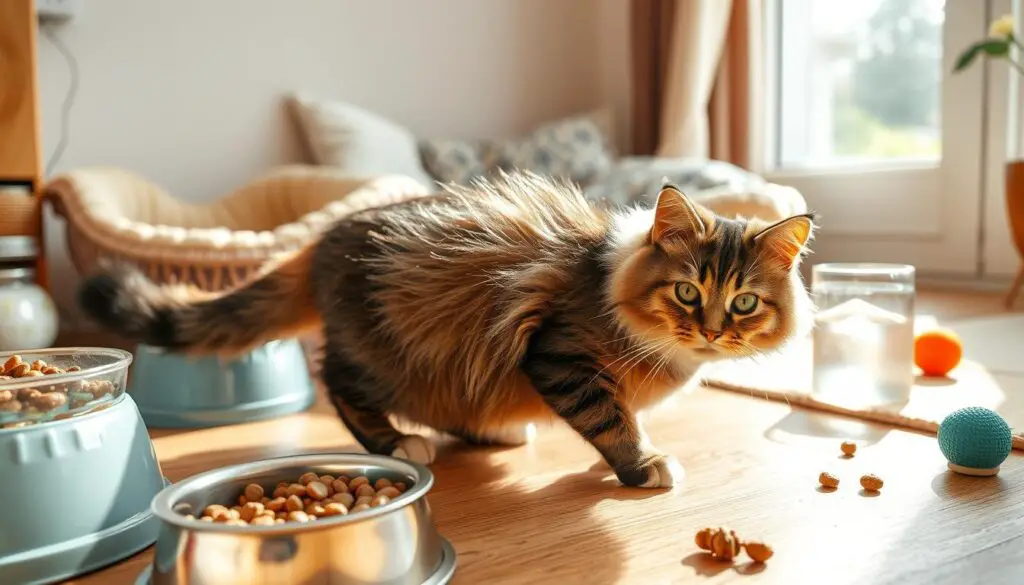
Keeping your cat at a healthy weight is important. It involves looking at different factors that might cause weight loss. Understanding these is key to preventing weight loss in cats well. Environmental factors and managing stress are crucial for your cat’s health.
Environmental Factors to Consider
A stable and calm environment is vital for your cat’s health. Cats do best in places where they feel safe and secure. Here are some environmental factors to think about:
- Stable routines reduce stress, leading to better eating habits.
- Creating safe spaces with hiding spots helps your cat feel more secure.
- A calm atmosphere minimizes anxiety, which can negatively impact appetite and weight.
Stress and Anxiety Management
Effective cat stress management strategies can greatly help your cat’s eating habits. Stress and anxiety can affect appetite and weight. Here are some tips:
- Provide plenty of mental stimulation through toys and interactive play.
- Maintain a consistent feeding schedule.
- Use calming products, such as pheromone diffusers, to alleviate anxiety.
Weight Gain Strategies for Cats
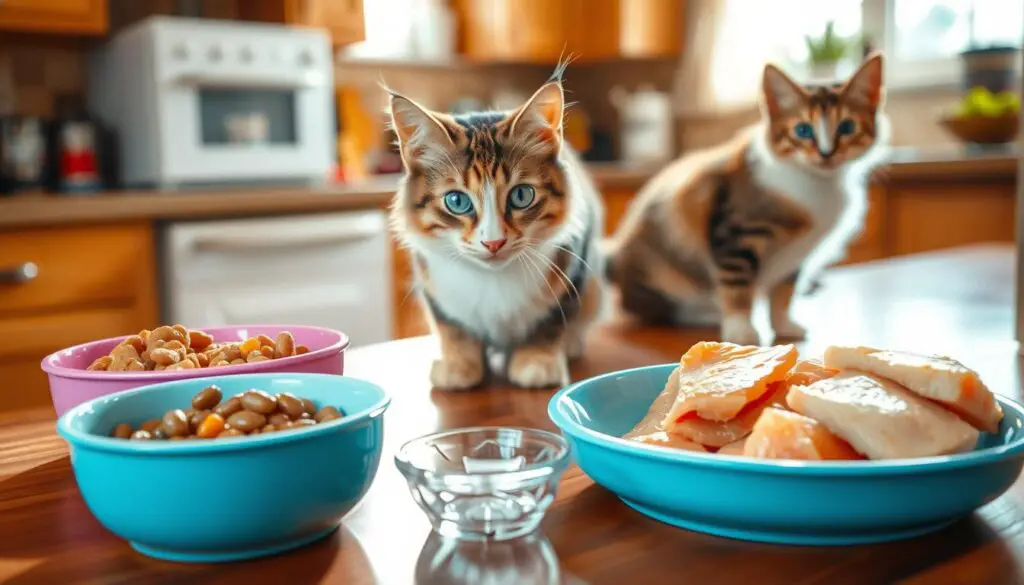
When a cat needs to gain weight, safety and effectiveness are key. Using the right strategies can help them get healthier. Slow changes in their diet and how they eat can really help.
Safe Weight Gain Practices
Safe weight management for cats involves a few steps:
- Start Slow: Increase food portions slowly to avoid sudden changes.
- Offer Frequent Meals: Small meals all day help with digestion.
- High-Calorie Foods: Use foods like Royal Canin Veterinary Diet Recovery RS for slow weight gain.
- Monitor Body Condition Score: Keep the cat’s score between 4 to 6 for best health.
Supplements and Treats to Consider
Right supplements can help a cat gain weight well:
- Appetite Stimulants: Talk to a vet about meds to boost appetite.
- Palatable Kittens Food: Use kitten food, which is high in calories and tasty.
- Enticing Treats: Give small, high-protein snacks to encourage eating.
- Customized Nutrition: Always get a vet’s advice for diets that fit the cat’s health.
Understanding the Aging Cat
As cats get older, they often see weight changes. These changes can come from aging, health problems, or changes in energy. Knowing about these changes helps owners care for their aging cats better.
Weight Changes in Senior Cats
About 15 percent of cats over 12 years old have too little muscle or are underweight. Senior cats lose a lot of muscle mass as they age. Cats over 11 may need more food to stay healthy, if they can eat well.
Weight loss in older cats can be caused by:
- Dental disease
- Inflammatory bowel disease
- Chronic kidney disease
- Hyperthyroidism
- Diabetes mellitus
- Cancer
- Degenerative joint disease (arthritis)
Even if they eat well, senior cats can still lose weight. This can be due to hormonal issues or not getting enough nutrients.
Adjusting Care for Older Cats
Keep a close eye on your aging cat for signs of weight loss. Look for vomiting, changes in behavior, or less activity. Vets may recommend special treatments to help them gain weight and stay healthy.
Senior cats should slowly gain weight until they’re at their ideal weight. This is decided by a vet.
| Age Category | Human Age Equivalent | Common Health Concerns |
|---|---|---|
| Senior (11-14 years) | 60-72 years | Dental disease, arthritis, kidney disease |
| Geriatric (14+ years) | 76 years and older | Hyperthyroidism, diabetes, cognitive dysfunction syndrome (CDS) |
Regular vet visits are key for older cats. They should have blood, urine, and fecal tests at least once a year. This helps catch and manage health issues early, keeping them healthy and happy.
The Genetics of Cat Weight
Knowing what affects a cat’s weight is key to their health and happiness. The genetics of cat weight are important, as different breeds have unique traits. Some breeds, like the Oriental Shorthair and modern purebred Siamese, are naturally leaner. Others have different weight norms.
Understanding these breed-specific weight norms helps pet owners meet their cat’s needs. It also helps spot any weight-related issues early on.
Understanding Breed-Specific Weight Norms
Every cat breed has its own weight range. Knowing this is crucial for owners who want to keep their cat healthy. Here are some common breed-specific weight norms:
| Breed | Average Weight (lbs) | Comments |
|---|---|---|
| Siamese | 6-14 | Generally lean with a long body |
| Oriental Shorthair | 8-12 | Alert and active, tends to be slimmer |
| Maine Coon | 10-25 | One of the largest breeds, muscular and heavy |
| Bengal | 8-15 | Muscular build, active and agile |
How Genetic Factors Affect Health
Genetics do more than just affect weight; they impact overall health and health risks. Some cats may face issues like diabetes or hyperthyroidism, making weight management harder. Cats with diabetes may eat well but still lose weight because they can’t absorb calories well.
Cats with hyperthyroidism burn calories fast, often needing more food to stay healthy.
Knowing these genetic factors is why it’s so important to watch your cat’s body condition. It’s also why getting regular vet care is crucial. A vet can help with food and diet changes to help your cat reach a healthy weight.
Myths and Facts About Cat Weight
Understanding myths about cat weight is key for cat owners. Misunderstandings about healthy weight can confuse and mislead. For example, some cats are naturally skinny due to their breed or genes. Knowing these myths helps give the right reliable cat care information.
Debunking Common Misconceptions
Here are a few common myths that need clearing up:
- Skinny cats are always unhealthy.
- All vets have enough knowledge of feline nutrition.
- It’s safe to make raw diets without proper nutrition.
- Neutering alone determines weight and body structure.
These myths can change how owners see their cats’ health. Knowing the facts helps make better care choices.
Reliable Sources for Cat Care Information
To get the best info on feline nutrition and wellness, check these reliable sources:
- Vets with a focus on feline health.
- Pet nutritionists who know specific needs.
- Animal welfare groups that promote good cat care.
- Research from top veterinary nutrition journals.
Getting advice from experts can clear up wrong info and keep your cat healthy. This comes from accurate reliable cat care information.
Conclusion: Caring for Your Skinny Cat
Caring for skinny cats means more than just feeding them. It’s about knowing their nutritional needs, understanding their behavior, and keeping up with vet visits. Cat owners should watch for any changes in their cat’s weight or behavior. These could be signs of a health problem.
Feeding them high-calorie foods, fixing dental issues, and managing stress can help. These actions can lead to a healthier weight for your cat.
Final Tips for Cat Owners
Meeting your cat’s needs is crucial. This includes playing with them and giving them a balanced diet. Watching how they eat and taking them to the vet regularly can stop serious health problems. This way, any weight loss issues can be caught early.
Preventing health issues is important. Many things, like stomach problems or stress, can cause big weight changes. So, it’s essential to keep an eye out for these signs.
Building a Stronger Bond with Your Cat
Helping your cat get healthier is not just about their weight. It’s also about building a strong bond. Spending time with your cat, playing and showing love, can reduce stress and anxiety. This creates a happy environment where your cat is more likely to eat well.
Creating a strong bond with your cat is good for their health and strengthens your connection. It makes your relationship more meaningful and enjoyable.
FAQ
What should I do if my cat is underweight?
How can I tell if my cat is too skinny?
What are some common reasons for weight loss in cats?
How important is nutrition for my cat’s weight management?
What feeding schedule should I follow for my skinny cat?
How often should I weigh my cat to monitor their progress?
When should I seek veterinary help for my underweight cat?
What behavioral changes might indicate my cat is underweight?
What types of exercises can help my cat maintain a healthy weight?
Are there safe ways to help my cat gain weight?
How do genetics influence my cat’s weight?
What are some common myths about cat weight management?
Source Links
- https://www.catster.com/cat-health-care/my-cat-is-so-skinny-i-can-feel-her-bones/
- https://www.catsluvus.com/cat-grooming/my-cat-is-so-skinny-i-can-feel-her-bones-causes-and-solutions/
- https://total.vet/cbd-cat-too-skinny/
- https://vcahospitals.com/know-your-pet/body-condition-scores
- https://www.petobesityprevention.org/catbcs
- https://www.royalcanin.com/us/cats/health-and-wellbeing/using-a-cat-body-condition-score
- https://www.bellaandduke.com/cats/expert-advice/cat-health/underweight-cats-a-complete-guide-to-help-them-gain-weight/?srsltid=AfmBOoqwLVttBfq9S3fDEnwElO55eqgjiTDH3duFIHsyFp_7uqJ4zk4v
- https://www.hamptonveterinaryhospital.com/services/cats/blog/optimizing-feline-health-every-bite-doctors-discussion-nutritional-needs-through
- https://vcahospitals.com/know-your-pet/creating-a-weight-reduction-plan-for-cats
- https://www.catsluvus.com/cat-grooming/cats-and-nutrition-the-best-foods-for-optimal-health/
- https://www.expertcatcare.com/article/how-to-body-condition-score-your-cat-1-9-underweight-ideal-weight-or-overweight
- https://441animalhospitalboca.com/blog/cat-too-skinny/
- https://www.bellaandduke.com/cats/expert-advice/cat-health/underweight-cats-a-complete-guide-to-help-them-gain-weight/?srsltid=AfmBOoot9L5xgDppoiAYqiAZuRol6spDx3ksV66vyVQpNsqM5-XuyoU2
- https://vcahospitals.com/know-your-pet/recognizing-signs-of-illness-in-cats
- https://www.bellaandduke.com/cats/expert-advice/cat-health/underweight-cats-a-complete-guide-to-help-them-gain-weight/?srsltid=AfmBOooO2EOm25YE6DXWoaVeAJwas9rg5XUF-NKzyjDippeUV7YJcnsT
- https://www.preventivevet.com/pets/is-your-pet-too-bony
- https://vetmed.illinois.edu/wp-content/uploads/2015/09/26.-Skinny-Old-Cats-Word-File.pdf
- https://www.cats.org.uk/help-and-advice/diet/underweight-cats
- https://bettervet.com/resources/pet-symptoms/why-is-my-cat-losing-weight
- https://vcahospitals.com/know-your-pet/exercise-and-your-obese-cat
- https://www.carecredit.com/well-u/pet-care/is-your-cat-fit-or-fat/
- https://www.bellaandduke.com/cats/expert-advice/cat-health/underweight-cats-a-complete-guide-to-help-them-gain-weight/?srsltid=AfmBOoqP7xWZA7m_abk3EYGWgWvUWcu0T2bBWGesQXUvZ0YtLQJFjXzt
- https://www.purina.co.uk/articles/cats/health/symptoms/cat-losing-weight
- https://www.sheba.com.sg/cat-language-of-love/general-care-articles/help-cat-gain-weight
- https://www.petmd.com/cat/nutrition/what-feed-cat-weight-gain
- https://www.greatpetcare.com/cat-health/older-cat-losing-weight/
- https://vcahospitals.com/know-your-pet/helping-our-senior-cats-age-gracefully
- https://www.papayapet.com/resources/8-signs-your-cat-is-aging/
- https://thecatsite.com/c/feel-cats-spine/
- https://www.beltonvetclinic.com/services/cats/blog/cat-obesity-how-help-your-cat-lose-weight
- https://catnutrition.org/faqs/
- https://www.cats.org.uk/cats-blog/why-do-cats-have-a-primordial-pouch
- https://www.tuxedo-cat.co.uk/my-cat-is-so-skinny-i-can-feel-her-bones/

Hello, this is Frank Swanson, the owner, and operator of Pet Info Hut. I created this website as a way to share my love of pets with the world. I have over 7 years of experience working with animals, and I have a passion for helping people care for their pets. I hope that you find my website useful and informative. Thanks for visiting!

